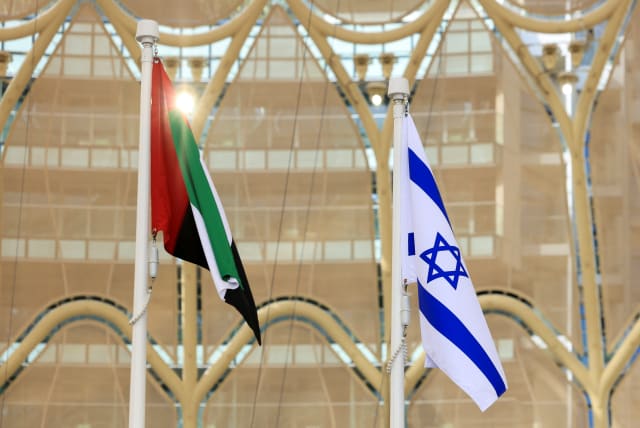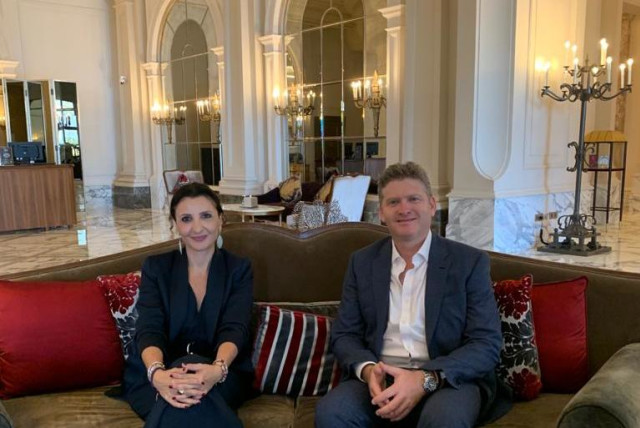Abraham Accords opened Israel to the Middle East's 'most dynamic trading hub'

Dorian Barak discusses the third anniversary of the Accords and how trade has been normalized and blossomed with countries in the region and globally.
The third anniversary of the Abraham Accords has come at a time when a lot of media coverage has focused on the possibility of progress in Israel and Saudi Arabia ties. This could potentially be very important.
On another level, the Accords have also led to a lot of opportunities for Israeli companies in the Gulf.
Recently, The Jerusalem Post spoke with Dorian Barak, an investor and entrepreneur resident in Israel and the UAE. He is the president and co-founder of the UAE-Israel Business Council.
Dorian Barak: Abraham Accords have far exceeded their expectations
“Looking back three years, the Accords have far exceeded their expectations from a commercial perspective. We have about $3 billion dollars in annual bilateral trade between Israel and the UAE. But that doesn’t tell the whole story. It doesn’t count all the services, tourism and other non-goods trade that is being conducted in, with and through the UAE - not just with Emiratis, but with trading partners from across the Middle East, South Asia and beyond. In total, this far exceeds $3 billion, and the UAE-Israel Business Council forecasts this to exceed $5 billion by the end of 2025.”
This is very important. “That is the unspoken and unseen progress of the Abraham Accords. Israelis have been welcomed in the region’s most dynamic trading hub.” A lot of companies from places like India and even countries Israel doesn’t have diplomatic relations with are doing business in the UAE.
“There is a tremendous amount of third-country trade that takes place through the UAE, making use of the country’s excellent infrastructure, logistics and transportation links. That’s what makes the UAE such a convenient business hub,” Barak says.
He says that “trade between Israel and the region has been normalized we are seeing a blossoming of commercial ties; both with countries Israel had relations with, such as Egypt and Jordan, and with new markets as well where there are no official relations. The stigma has been taken away, in large part, and many people from these countries now feel comfortable engaging with Israelis.”
There is a lot of new discussion about economic ideas that can knit the Middle East into a trading corridor that stretches from India via the Middle East to Europe. This concept was discussed at the G20. But is it realistic? “In terms of something that inspires the imagination, it is a brilliant idea. I have difficulty seeing how it becomes concrete in the short or medium term. Not just because it passes through so many countries, but also because the infrastructure implications of this are so enormous,” Barak says.
As Israelis learn about the UAE and its possibilities it is also changing some of the understanding of what the Accords will bring as they enter their fourth year. In the beginning, some believed that Israel’s start-ups might be able to “scale up” in the UAE. Has this happened?
“The simple answer to that is: Not yet,” Barak says. “Some Israeli companies have scaled up here, certainly, but not in large numbers. However, many have found the UAE as a market in its own right, and also a place to develop their sales, business development, and eastward expansion. And being here they are part of the principal business hub of the Middle East.”
The UAE is a convenient location to serve India and other areas in Africa and Asia, he points out. “Israelis that have established themselves here are using this as an offshore platform to scale up and outwards.”
Doing business in the UAE has certain distinct advantages over Israel, he points out. “People can travel here with no restriction, entry and departure is straightforward, it’s simple to get a work permit, the bureaucracy is manageable, you can hire from across the world, and the logistics here can make it easy to ship merchandise and pre-position inventory here. To deal with anything east of Israel, there’s really no better place to operate than in the UAE. Israel is quite difficult from a regulatory perspective and the authorities can be unpredictable, with frequent disruptions such as protests, strikes, holidays that don’t align with the region, and government issues. This is a 24/7 economy.”
Israel offers other benefits, mainly around innovation and resourcefulness, and Israelis’ global orientation, Barak says. “These are important characteristics and drive the innovation economy.” He says Israel’s tech success is a shining example of what Israel offers. However, “as far as tech is concerned, with all that Israel offers, there is fierce competition and Israelis face an uphill battle penetrating the local market,” he says. The UAE has many potential partners for technology goods beyond Israel. The scale players here in solar and water and waste have little if anything to do with Israel. Take DEWA, the power company in Dubai. They have one of the most ambitious and effective solar initiatives in the world. They’re producing a huge amount of power from renewable sources. As far as I know, Israeli solar companies are not involved in this business – it’s home grown or sourced from China and the US and Europe.”
Another question is whether opening up Israel to the dynamic hub of the Gulf would change Israel. So far it hasn’t happened. “If we thought that exposure to an open, efficient and economically dynamic new market in the region would change Israel, I think we were wrong. We have a tremendous amount to learn from the UAE and people understand the lessons,” Barak says. “. If you want to ask me for ten improvements Israel can make to its business environment, you can copy most of them from the UAE rule book. Bureaucratic efficiency, tax certainty, ease of import/export, movement of people, import of skilled labor, government engagement with the private sector, and so on.”
Nevertheless, Israel has a lot of unique capabilities. “There is still a ‘special sauce’ in Israel that produces incredible people who do amazing things across the region and beyond. They’re unparalleled in many areas. Israelis innovate like no one else, they experiment with new business models, and they’re almost programmed to question and then challenge barriers,” he notes. But he also notes that the cost of living in Israel is very high “the judicial reforms and the protests are scaring away investors, and the political system and government isn’t focused on business in any real way.”
Israelis operating in the Gulf
Today, as Israel grows and has a population burgeoning on 10 million people, Israelis are operating in the Gulf.
Barak notes that Israel is doing little to encourage foreigners to come and compete as part of a business hub in Israel.
“What are we doing to make life easier for foreign investors? Not much. That said, there’s something very resilient about the start-up nation. Precisely because Israel is such a small market, Israelis have a very global outlook and are expert at taking their products and technology to the world.”
This matters going forward. As people discuss normalization with other countries in the region, the Abraham Accords continue to be an important part of the process. “Peace with the UAE and Bahrain normalized the atmosphere with Morocco and Egypt and Jordan and made it more possible to have peace with Saudi and Oman. Peace with Saudi would make it easier for peace with Pakistan and Indonesia.
"However, the specific nature of democracy in these countries makes it more fraught and complicated; it’s less top-down,” Barak says.
Jerusalem Post Store
`; document.getElementById("linkPremium").innerHTML = cont; var divWithLink = document.getElementById("premium-link"); if (divWithLink !== null && divWithLink !== 'undefined') { divWithLink.style.border = "solid 1px #cb0f3e"; divWithLink.style.textAlign = "center"; divWithLink.style.marginBottom = "15px"; divWithLink.style.marginTop = "15px"; divWithLink.style.width = "100%"; divWithLink.style.backgroundColor = "#122952"; divWithLink.style.color = "#ffffff"; divWithLink.style.lineHeight = "1.5"; } } (function (v, i) { });


